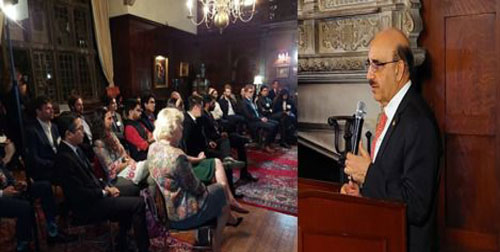Masood thanks US for additional humanitarian assistance for flood relief
The relations between Pakistan and the US are once again on the path of holistic growth and expansion”, Ambassador Masood Khan said while addressing foreign students studying in US universities at the International Students House in Washington D.C.
The International Student House has 190 residents from 28 countries.
The Ambassador also thanked the United States for giving additional assistance of $30 million to help millions of people in Pakistan whose lives were devastated by the recent floods. He appreciated that so far the United States has contributed $97 million to support Pakistan’s initial rescue, relief and early recovery operations following the floods.
The Pakistan Envoy said that after a brief period of uncertainty following US troops’withdrawal from Afghanistan in August last year, the two sides have recalibrated, reenergized, and rejuvenated their longstanding partnership. While the emphasis on strategic coordination continues, he said, to jointly face challenges of terrorism and regional stabilization, efforts are being made to advance the two countries economic agenda by accelerating the pace for engagement on trade, investment, energy, agriculture, science and technology.
Masood Khan said that Pakistan is poised to become a regional tech hub because of successful launch of thousands of tech startups in the past two years. He informed his audience that International Venture Capital firms such as Kleiner Perkins, Tiger Global Management, Dragoneer Investment Group and Acrew Capital from the United States, Kingsway Capital from the United Kingdom, Speedinvest from Europe, Gobi Partners from China and Shorooq Partners from the UAE have started financing Pakistan’s tech sector at pre-seed, seed and early stages of incubation.
Ambassador Khan invited international students and their respective countries to invest in Pakistan’s tech industry where they would be able to interact and transact with tech savvy young Pakistani professionals who are driving the digital revolution in Pakistan.
The Ambassador appealed to the students to transcend national boundaries and work as global citizens for international peace and security, interfaith harmony and elimination of poverty. “You ought to be architects of a better future for humanity”, he said.
After giving a detailed account of the devastation caused by unprecedented and deadly floods in Pakistan, the Ambassador said that countries like Pakistan which were a victim of extreme weather patterns had a legitimate expectation for climate justice. “Pakistan contributes 0.4% to global emissions but it is the 8th most vulnerable country to climate change. The recent floods are a demonstration of that phenomenon”, he said. There was a growing consensus for the recognition of the principle of ‘loss and damage’, he added.
The Ambassador said that apart from global politics on climate change, it was imperative that Pakistan was supported by the international community to rehabilitate displaced population, rebuild a resilient infrastructure and reconstruct the destroyed neighborhoods, schools and healthcare facilities.
The Ambassador’s presentation was followed by an interactive session during which students from Mexico, India, Indonesia, Singapore, the US and several other countries asked questions about the future of Pak-US relations and the prospects of peace between India and Pakistan.
The Ambassador was welcomed by Michelle Bond, President of the Board of International Student House and hosted by its Executive Director, Daniel Bremer.










